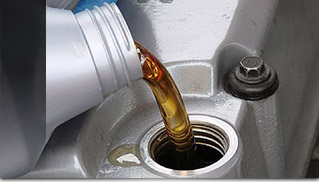 There are basically two types of oil that you can put in your classic muscle car’s engine; conventional and synthetic. Conventional motor oils are distilled from crude, pumped-out-of-the-ground, oil and are the kind of oil that has been used in internal combustion engines for over 100 years. About 20 years ago, synthetic motor oils entered the marketplace. These are essentially “designer motor oils” that are created from a blend of pure hydrocarbon compounds. Synthetic motor oils are superior to conventional oils in virtually all respects. They are more slippery, hold up better in temperature extremes, last longer, and can provide superior lubrication to internal rubber and other materials. They even contribute to higher gas mileage.
There are basically two types of oil that you can put in your classic muscle car’s engine; conventional and synthetic. Conventional motor oils are distilled from crude, pumped-out-of-the-ground, oil and are the kind of oil that has been used in internal combustion engines for over 100 years. About 20 years ago, synthetic motor oils entered the marketplace. These are essentially “designer motor oils” that are created from a blend of pure hydrocarbon compounds. Synthetic motor oils are superior to conventional oils in virtually all respects. They are more slippery, hold up better in temperature extremes, last longer, and can provide superior lubrication to internal rubber and other materials. They even contribute to higher gas mileage.
Given that synthetics are so good, a common question is whether they can be used in engines that were designed before synthetic oils even existed? If you have a 1960s or 70s muscle car, then that certainly is the case. The answer is that frankly, “it depends”. If you have an unrestored muscle car, you may want to stick with standard motor oils. Older vehicles tend to have engines that have larger clearances between internal moving parts due to normal mechanical wear and tear. This can prove problematic for synthetic oils which are made up of thinner, smaller molecules and tend to be more free flowing. In fact, many people have reported that when they started using synthetic motor oil in their higher mileage car that oil consumption increased significantly. Another reason to stick with conventional oils is that original classic car engines also have internal rubber parts that were designed for standard oils and may perform a slight amount differently with synthetic oils.
Alternatively, If you have an engine in your muscle car that is newly rebuilt, it probably makes sense to go with a synthetic oil. All the internal tolerances will be tight in a newly rebuilt engine and all the gaskets and seals will be “synthetic-friendly”. And, believe it or not, the synthetic oils can actually increase an engine’s horsepower a small degree because of it’s extremely slippery nature. No question this is a positive!
If you have further concerns about what oil to use, you always can perform research on the web but an under-utilized resource is the oil manufacturers themselves. Most of the major oil manufacturers have extensive websites and customer support channels that you can utilize. This is a good way to “ask the experts” as they are the ones who actually make the oils. Plus, some of their engineers are likely classic car buffs themselves and are sure to steer you in the right direction..
Source: Urse Chrysler of Fairmont